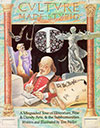The true artist must always suffer for his art. If you don’t suffer for your art, you won’t know how to make other people suffer for it when it’s their turn.
As Robert Frost nearly said, ‘No cries of agony in the writer, no cries of agony in the reader.’
(signed)
H. Smiggy McStudge








Recent Comments